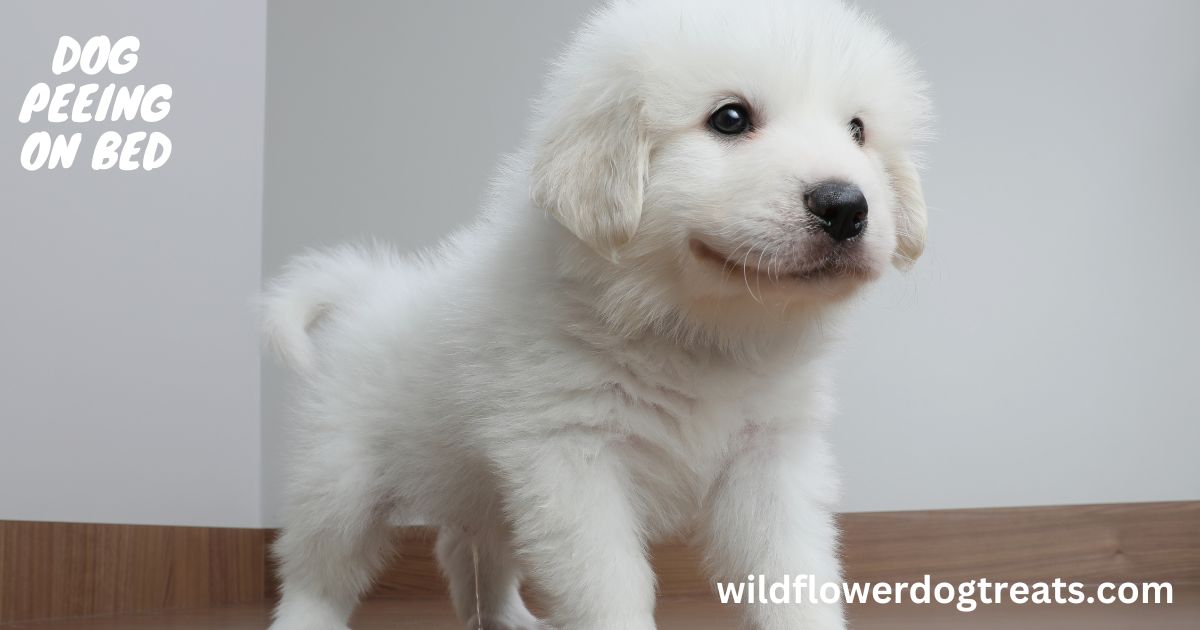Dogs may pee on your bed due to territorial marking or medical issues. It’s important to address this behavior promptly. Dog Peeing on Bed.
When it comes to understanding why your dog pees on your bed, it’s essential to consider various factors that could be contributing to this behavior. Dogs may urinate on your bed for reasons such as marking their territory, feeling anxious or stressed, or due to medical issues.
Understanding the underlying cause can help you take appropriate measures to address and prevent this behavior in the future. Dog Peeing on Bed. We’ll explore the possible reasons why dogs pee on beds, how to address this behavior, and provide guidance on training and managing your dog to prevent such incidents. By gaining insight into your dog’s behavior and needs, you can create a comfortable and secure environment for both you and your furry friend.
Lack Of Housetraining: A Common Culprit
One of the most common reasons why a dog might pee on your bed is the lack of proper housetraining. Without appropriate training, your furry friend may not fully understand where they are allowed to relieve themselves. Dog Peeing on Bed. This issue is often compounded by a few key factors, from inadequate housetraining techniques to behavioral factors leading to accidents, which we’ll delve into below to help pet owners address this problem effectively.
Inadequate Housetraining Techniques
Inadequate housetraining techniques play a significant role in a dog’s understanding of appropriate potty behaviors. When the housetraining process is inconsistent or lacks clarity, the dog may not fully grasp where they should and shouldn’t eliminate waste. Owners who are unsure of effective housetraining methodologies often see their pets struggle to learn the appropriate bathroom behavior.
The Significance Of Early Training
Early training is crucial for instilling good potty habits in dogs. Dog Peeing on Bed. When puppies are taught from a young age where they are supposed to relieve themselves, they are more likely to carry that knowledge into their adult years. If a dog has not received early and consistent housetraining, they may struggle to understand where they should go to the bathroom as they grow and mature.
Consistency In Reinforcing Positive Behavior
Maintaining consistency in reinforcing positive behavior is key in housetraining. When a dog is praised and rewarded for going to the bathroom in the correct spot, they are more likely to continue that behavior. Conversely, inconsistency in positive reinforcement may lead to confusion for the dog regarding where they should be eliminating waste.
Behavioral Factors Leading To Accidents
In some cases, behavioral factors can also contribute to accidents. Dogs may not only struggle with the physical aspect of housetraining, but also with behavioral tendencies that lead them to urinate in inappropriate places, such as marking behavior and separation anxiety.
Separation Anxiety And Marking Behavior
Separation anxiety and marking behavior are common issues that may cause a dog to pee on the bed, particularly when they are feeling stressed or insecure. Addressing these underlying emotional issues can be as important as teaching your pet where it is appropriate to urinate.
Lack Of A Designated Potty Area
Without a designated potty area, a dog may not fully understand where they are supposed to go to the bathroom. Establishing a consistent and specific spot for your dog to relieve itself can eliminate confusion and help reinforce proper bathroom behavior.
Medical Issues: An Often Overlooked Cause
Discover the often overlooked cause of why your dog might be peeing on your bed: medical issues. Uncover the reasons behind this behavior and learn how to address it.
When a dog pees on your bed, it may be indicative of an underlying medical issue that is often overlooked. It’s important to consider possible health conditions that could be causing this behavior, as addressing these issues is crucial for your pet’s well-being.
Urinary Tract Infections And Other Health Conditions
Dogs can suffer from urinary tract infections (UTIs) and other health conditions that can lead to accidents, including bladder stones, diabetes, and kidney disease. These issues can cause discomfort and lead to inappropriate urination, understanding the signs and symptoms of these conditions is crucial.
Identifying Signs And Symptoms
Signs of a urinary tract infection or other health problems in dogs might include frequent urination, straining to urinate, blood in the urine, and incontinence. If you notice any of these signs, it’s important to promptly seek veterinary guidance.
Seeking Veterinary Guidance
If your dog is exhibiting signs of urinary issues or incontinence, it’s important to schedule a visit to the veterinarian. A professional evaluation and proper diagnosis are essential for determining the best course of treatment for your pet.
Age-related Incontinence
Aging can also contribute to incontinence in dogs. As pets get older, the muscles that control bladder function may weaken, leading to accidents. Understanding the impact of aging on bladder control can help you effectively manage the issue.
Potential Treatment Options
Treatment options for dogs suffering from urinary issues or age-related incontinence can include medication, dietary changes, and behavioral modifications. Your veterinarian can provide guidance on the most appropriate approach based on your dog’s specific condition and needs.
Stress And Anxiety: Unraveling The Connection
As dog owners, we often experience moments of confusion and frustration when we find our beloved pets have urinated on our bed. While it may seem like an unusual behavior, it’s important to understand that dogs, just like humans, can experience stress and anxiety. Unraveling the connection between stress and bed-wetting can help us better understand our furry friends and address their needs accordingly.
Environmental Stressors And Their Effects
Our dogs are highly perceptive creatures, and their surroundings can greatly impact their emotional well-being. Whether it’s loud noises, changes in temperature, or a new environment, dogs can feel overwhelmed by these environmental stressors. When faced with an overwhelming situation, some dogs may resort to urinating on the bed as a way to cope with their anxiety.
Changes In Routine Or Household Dynamics
Dogs thrive on routine and stability, and any disruptions to their daily lives can lead to stress and anxiety. Changes such as a new work schedule, a new family member, or even a move to a different house can trigger bed-wetting in dogs. It’s important to recognize these changes and provide extra support and reassurance to help them adjust.
Introduction Of New Pets Or Family Members
Introducing a new pet or family member into the household can be both exciting and challenging for our furry friends. Suddenly sharing their space and attention with a newcomer can create feelings of insecurity and anxiety. Dogs may resort to urinating on the bed as a way of marking their territory or expressing their stress. Proper introductions and gradual integration can help minimize these anxieties and prevent accidents.
Anxiety-related Behaviors
Just like humans, dogs can display a range of anxiety-related behaviors, including bed-wetting. Excessive barking, destructive chewing, and restlessness are some common signs of anxiety in dogs. If your furry friend is experiencing these behaviors along with urinating on the bed, it’s important to address their anxiety holistically to help alleviate their stress and prevent future accidents.
Submissive Urination And Fear-based Accidents
Some dogs urinate on the bed out of fear or as a submissive gesture. This behavior is common in dogs who feel intimidated or overwhelmed by certain situations or individuals. It’s important to create a safe and secure environment for your dog, minimizing any potential sources of fear or intimidation. Positive reinforcement-based training and gradual exposure to triggers can help build their confidence and reduce the likelihood of submissive urination or fear-based accidents.
Managing Stress To Prevent Bed-wetting
Preventing bed-wetting in dogs requires a proactive approach to managing stress and anxiety. Here are some strategies that can help:
- Stick to a consistent routine to provide your dog with a sense of stability.
- Create a calm and safe environment, minimizing any potential stressors.
- Use positive reinforcement-based training techniques to build your dog’s confidence.
- Gradually introduce new pets or family members, allowing your dog to adjust at their own pace.
- Consider consulting with a professional dog trainer or behaviorist for additional guidance and support.
Remember, understanding the connection between stress and bed-wetting is crucial in addressing our dog’s needs. By managing their stress and anxiety, we can help our furry friends feel secure, preventing bed-wetting incidents and fostering a happy and healthy bond with them.
Territorial Marking: Establishing Boundaries
One of the most frustrating behaviors that dog owners may encounter is when their furry friend decides to mark their territory by urinating on their bed. This territorial behavior can be perplexing and exasperating, leaving owners questioning why their pup is exhibiting such behavior. In this article, we will delve into the topic of territorial marking and explore the various factors that may contribute to this behavior. Understanding why dogs pee on beds is crucial in order to address and modify this unwanted behavior effectively.
Intact Males And Their Instinctual Behavior
All dogs have an innate need to establish and defend their territory, and intact males are known to exhibit this behavior more prominently. In the wild, the dominant male would mark his territory, warning other males to stay away. This territorial marking behavior is deeply rooted in their genetics and can be carried over into domestic settings. When a male dog pees on your bed, it may be an attempt to assert dominance and claim the space as their own.
The Influence Of Hormones
Hormones play a significant role in territorial marking behavior, particularly in intact males. Testosterone, the primary male hormone, can heighten the urge to mark territory. This hormone not only affects their behavior but also impacts their urine’s scent, which contains pheromones that communicate messages to other dogs. The strong scent left behind by their urine acts as a signal to other dogs, establishing boundaries and conveying information about their presence.
Neutering And Its Impact On Marking
Neutering, or the surgical removal of a male dog’s testicles, can help reduce territorial marking behaviors. By eliminating the primary source of testosterone, neutering minimizes the urge to mark territory. However, it is important to note that neutering may not completely eliminate marking behavior, especially if the behavior has become ingrained over time. Consistency in training and redirection techniques are still essential to modify this behavior effectively.
Resource Guarding And Scent Marking
Resource guarding is another factor that can contribute to dogs peeing on beds. In some cases, dogs may mark their territory as a way to protect valuable resources such as their bed or belongings. Resource guarding is a natural instinct for dogs, rooted in their survival instincts from their ancestral past. By scent marking their possessions, they are signaling their ownership and deter others from encroaching on their territory.
Identifying Triggers And Addressing Territorial Behavior
Understanding the triggers that lead to territorial marking is crucial in addressing and modifying this behavior. Certain situations, such as the introduction of a new pet or changes in the household dynamic, can trigger anxiety and insecurity in dogs, leading to territorial marking. By identifying these triggers and addressing the underlying cause of their anxiety, owners can help their dogs feel more secure, reducing the need to mark their territory.
Positive Reinforcement And Redirection Techniques
When it comes to modifying territorial marking behavior, positive reinforcement techniques are highly effective. Instead of punishing your dog for the unwanted behavior, focus on redirecting their attention to appropriate areas for eliminating, such as designated potty spots. Rewards and praise for using the appropriate areas will encourage them to continue the desired behavior while discouraging marking on the bed. Consistency and patience are key in retraining your dog’s behavior.
Behavioral Training And Remedies: Addressing The Issue
Dealing with a dog urinating on your bed can be both frustrating and perplexing. However, it’s important to remember that this behavior can often be addressed through proper behavioral training and the implementation of effective remedies. By utilizing positive reinforcement methods, housetraining techniques, and appropriate deterrents, you can help your furry friend understand the appropriate elimination behaviors and prevent accidents from happening on your beloved bed. In this article, we will explore various strategies, products, and training methods to tackle this issue head-on.
Positive Reinforcement Training Methods
Positive reinforcement training methods are highly effective when it comes to modifying a dog’s behavior. By using positive associations and rewards, you can incentivize good behavior and encourage your dog to eliminate in designated areas.
Here are some tips for using positive reinforcement to address urinating on the bed:
- Utilize treats and praise – Whenever your dog successfully eliminates in the appropriate area, reward them with a tasty treat and enthusiastic praise. This positive reinforcement will reinforce the desired behavior and motivate your dog to repeat it in the future.
- Consistency is key – Stick to a consistent schedule for feeding and bathroom breaks. This will help your dog develop a routine and understand when and where they should eliminate.
- Patience and persistence – Be patient with your dog during the housetraining process. Accidents may happen, but it’s important to remain consistent and continue reinforcing the appropriate elimination behaviors.
Reward-based Techniques For Housetraining
Housetraining your dog using reward-based techniques can be highly effective in preventing accidents on your bed. By associating positive experiences with eliminating in the right place, you can help your dog develop good habits.
- Designated elimination area – Designate a specific area in your yard where you want your dog to eliminate. Take your dog to this spot consistently and reward them generously when they eliminate there.
- Potty training pads – If you prefer indoor housetraining, using potty training pads can be beneficial. Gradually move the pads closer to the designated area outside until your dog is comfortable with eliminating in the desired location.
- Keep a close eye – Supervise your dog closely, especially during the initial stages of housetraining. This will allow you to catch accidents in the act and redirect your dog to the appropriate elimination area.
Reinforcing Appropriate Elimination Behaviors
Reinforce the appropriate elimination behaviors by consistently rewarding your dog for using the designated area. This will help solidify the connection between eliminating in the designated area and receiving positive reinforcement.
Some additional tips to reinforce appropriate elimination behaviors include:
- Use a specific command – Use a specific command, such as “go potty” or “do your business,” when you take your dog to the designated elimination area. Eventually, your dog will associate this command with the act of eliminating and understand what is expected of them.
- Monitor water intake – Keep an eye on your dog’s water intake, especially during the evening hours. Limiting access to water before bedtime can help reduce the likelihood of accidents during the night.
- Regular exercise – Ensuring your dog gets enough exercise throughout the day can help regulate their bathroom habits. Exercise helps stimulate the digestive system and encourages regular elimination.
Utilizing Deterrents And Management Strategies
In addition to positive reinforcement training, using deterrents and management strategies can discourage your dog from urinating on the bed.
- Bitter sprays or gels – Apply bitter sprays or gels to your bed to make it unpleasant for your dog to approach or urinate on. Dog Peeing on Bed. The bitter taste will deter them from repeating the behavior.
- Startle deterrents – Utilize startle deterrents, such as a noise-making device or a can filled with coins, to interrupt and redirect your dog’s behavior when they attempt to urinate on the bed.
- Supervision and confinement – Keep your dog confined to a designated area or use baby gates to prevent access to bedrooms when unsupervised. This will limit their ability to reach the bed and reduce the chances of accidents.
Protective Covers And Barriers For Beds
To provide an additional layer of protection for your bed, consider using protective covers or barriers.
- Waterproof mattress covers – Invest in a quality waterproof mattress cover to protect your bed from potential accidents. Dog Peeing on Bed. These covers can be easily cleaned and provide a barrier between your dog and the bed.
- Plastic sheets or mattress pads – Placing a plastic sheet or mattress pad under the bedding can deter your dog from urinating on the bed by creating an uncomfortable surface.
- Bedroom door barriers – Install a baby gate or use a pet gate to prevent your dog from entering bedrooms unsupervised. This can help minimize access to the bed and reduce the risk of accidents.
Notable Products To Discourage Accidents
There are several notable products available in the market that can help discourage accidents and reinforce appropriate elimination behaviors.
| Product | Description |
|---|---|
| Enzyme-based cleaners | Enzyme-based cleaners are specifically designed to eliminate the odor of urine, making them an effective choice for cleaning up accidents. This can help discourage repeat accidents in the same spot. |
| Potty bells | Potty bells act as a communication tool between you and your dog. Teach your dog to ring the bells whenever they need to go outside, encouraging appropriate elimination behavior. |
| Electronic training aids | Electronic training aids, such as motion-activated deterrents or training mats, can help create boundaries and discourage your dog from approaching or urinating on the bed. |
By implementing these behavioral training methods, housetraining techniques, deterrents, and utilizing protective covers for your bed, you can effectively address and resolve the issue of your dog urinating on your bed. With consistency, positive reinforcement, and patience, your furry friend will learn the appropriate elimination behaviors and keep your bed accident-free.
Frequently Asked Questions On Why Does Dog Pee On My Bed
Why Does My Dog Pee On My Bed?
Dogs may pee on your bed due to separation anxiety, marking their territory, or a medical issue. Ensure your dog has proper training, provide a cozy and secure bed, and consult a veterinarian if the problem persists. Positive reinforcement can also discourage this behavior.
Is It Normal For A Dog To Pee On The Bed?
No, it is not normal for a dog to pee on the bed. Dogs have various reasons for this behavior, including anxiety, territorial instincts, or health issues. Dog Peeing on Bed. Proper training, addressing anxiety, and seeking veterinary advice can help resolve this issue.
How Do I Stop My Dog From Peeing On The Bed?
To stop your dog from peeing on the bed, increase their daily exercise, establish a regular potty routine, crate train them, limit access to your bedroom, and clean any accidents thoroughly. Consistency, positive reinforcement, and seeking professional help if needed can aid in eliminating this behavior.
Can A Medical Issue Cause My Dog To Pee On The Bed?
Yes, medical issues such as urinary tract infections, bladder stones, or incontinence can cause dogs to pee on the bed. If your dog’s behavior is sudden or accompanied by other symptoms, consult a veterinarian to rule out any underlying health issues.
Proper diagnosis and treatment will help resolve the problem.
Conclusion
To sum it up, understanding why dogs pee on our beds is crucial to addressing this behavior. By considering the possible reasons – such as a medical issue, anxiety, territorial marking, or inadequate training – we can take effective steps to prevent and correct this unwanted habit.
Consulting with a veterinarian or an animal behaviorist can provide further guidance in resolving this issue and ensuring a harmonious relationship with our beloved pets.






